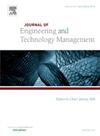Integrating AI and ESG in digital platforms: New profiles of platform-based business models
IF 3.9
3区 管理学
Q2 BUSINESS
Journal of Engineering and Technology Management
Pub Date : 2025-10-01
DOI:10.1016/j.jengtecman.2025.101913
引用次数: 0
Abstract
The integration of artificial intelligence (AI) into digital platforms is transforming the way businesses tackle environmental, social and governance (ESG) issues. This study investigates how AI can enable platform business models (Platform BMs) to create, deliver and capture ESG-related value, with a particular focus on the ESG rating industry. Using the Platform Business Model Canvas as a conceptual framework, and conducting a comparative analysis of six case studies, the research identifies three distinct configurations of AI-enabled Platform BMs: (1) ESG data wrangling and integration; (2) financial analysis and provision of ESG data to investors and companies; and (3) compliance and management of ESG issues in supply chains. Each configuration embeds specific mechanisms, such as predictive analytics, compliance automation and stakeholder coordination, through which AI can support ESG-oriented business innovation. Based on these findings, the study proposes four theoretical propositions that clarify the relationships between AI capabilities, data governance, and ESG value creation within platform ecosystems. The paper advances the academic understanding of the relationship between AI and sustainability and provides a typology to inform the strategic development of ESG-focused digital platforms.
在数字平台中整合AI和ESG:基于平台的商业模式的新概况
人工智能(AI)与数字平台的整合正在改变企业处理环境、社会和治理(ESG)问题的方式。本研究探讨了人工智能如何使平台商业模式(平台BMs)能够创造、交付和获取与ESG相关的价值,并特别关注ESG评级行业。本研究以平台商业模型画布作为概念框架,并对六个案例进行了比较分析,确定了支持人工智能的平台bpm的三种不同配置:(1)ESG数据整理和集成;(2)财务分析,向投资者和公司提供ESG数据;(3)供应链中ESG问题的合规与管理。每个配置都嵌入了特定的机制,例如预测分析、遵从性自动化和利益相关者协调,通过这些机制,人工智能可以支持面向esg的业务创新。基于这些发现,该研究提出了四个理论命题,阐明了平台生态系统中人工智能能力、数据治理和ESG价值创造之间的关系。本文促进了对人工智能与可持续发展之间关系的学术理解,并提供了一个类型学,为以esg为重点的数字平台的战略发展提供信息。
本文章由计算机程序翻译,如有差异,请以英文原文为准。
求助全文
约1分钟内获得全文
求助全文
来源期刊
CiteScore
8.00
自引率
6.20%
发文量
29
审稿时长
>12 weeks
期刊介绍:
The Journal of Engineering and Technology Management (JET-M) is an international scholarly refereed research journal which aims to promote the theory and practice of technology, innovation, and engineering management.
The journal links engineering, science, and management disciplines. It addresses the issues involved in the planning, development, and implementation of technological capabilities to shape and accomplish the strategic and operational objectives of an organization. It covers not only R&D management, but also the entire spectrum of managerial concerns in technology-based organizations. This includes issues relating to new product development, human resource management, innovation process management, project management, technological fusion, marketing, technological forecasting and strategic planning.
The journal provides an interface between technology and other corporate functions, such as R&D, marketing, manufacturing and administration. Its ultimate goal is to make a profound contribution to theory development, research and practice by serving as a leading forum for the publication of scholarly research on all aspects of technology, innovation, and engineering management.

 求助内容:
求助内容: 应助结果提醒方式:
应助结果提醒方式:


